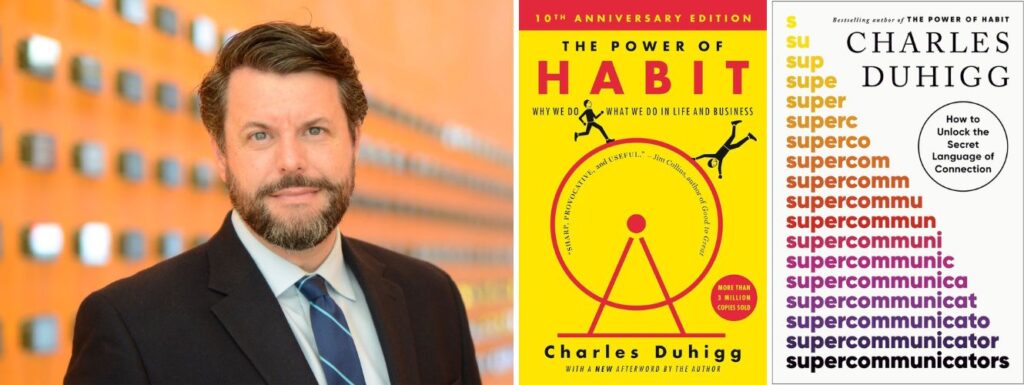Book Proposals, Writing Non-Fiction, And Supercommunicators With Charles Duhigg
Description
How can you write a book proposal that will make a publisher want to buy your book? How can you write a successful non-fiction book that both interests you and attracts a lot of readers? How can you improve your communication in person and online? Charles Duhigg gives his thoughts.
In the intro, HarperCollins CEO Brian Murray on audiobooks and AI [TechCrunch]; OpenAI's 12 days including Sora and o1; Google Notebook LM expansion; How Creatives Might Survive and Thrive in a Post-Productivity World [Monica Leonelle]. Plus, How to Write Non-Fiction, Second Edition.
Today's show is sponsored by Draft2Digital, self-publishing with support, where you can get free formatting, free distribution to multiple stores, and a host of other benefits. Just go to www.draft2digital.com to get started.
This show is also supported by my Patrons. Join my Community at Patreon.com/thecreativepenn
Charles Duhigg is a Pulitzer Prize winning journalist, a reporter at The New Yorker Magazine, and a multi-award-winning author whose book, The Power of Habit, spent three years on the New York Times list. His latest New York Times bestselling book is Supercommunicators: How to Unlock the Secret Language of Connection.
You can listen above or on your favorite podcast app or read the notes and links below. Here are the highlights and the full transcript is below.
Show Notes
- How the writing process differs between books and magazines
- Balancing what readers want to read and what you want to write
- Research that comes before and after a book proposal
- Tips for conducting successful research interviews
- The process of organizing research for a nonfiction book
- Improving the art of written communication
- Dealing with the fear of miscommunication and judgement
- The importance of connection in communication
You can find Charles at CharlesDuhigg.com.
Transcript of Interview with Charles Duhigg
Joanna: Charles Duhigg is a Pulitzer Prize winning journalist, a reporter at The New Yorker Magazine, and a multi-award-winning author whose book, The Power of Habit, spent three years on the New York Times list.
His latest New York Times bestselling book is Supercommunicators: How to Unlock the Secret Language of Connection. Welcome to the show, Charles.
Charles: Thank you for having me. This is such a treat.
Joanna: I'm excited to talk to you. So first up—
Why did you get into writing books when journalism has clearly been such a success for you?
Charles: Well, it actually started when my wife was pregnant with our first child, and we didn't have any money, and so I thought, okay, I'll go write a book. Maybe that'll give me enough money so that maybe we can find a decent place to live.
My first book was The Power of Habit, about the science of habit formation, and it really came out of my own problems and questions. I wanted to figure out how to improve my habits, how to be able to lose weight and exercise more easily.
The process of writing a book, I found, is such a total joy and also overwhelmingly hard.
You get to get so deep into the material, you get to understand what's going on. Not only what experts are telling you and what stories you ought to tell, but also you get to think about the ideas in really profound ways.
So that just kind of became an addiction for me. I've really enjoyed writing books. Even though if you asked me in the middle of them, I would tell you it's the worst thing I've ever done in my entire life.
Joanna: Well, yes, all of us listening understand that.
It is interesting because, I mean, there's a lot of comparisons to your journalism. You interview a lot of people, and you include a lot of that.
How is the process of these longer form books different to your journalism pieces?
Charles: So it's a little akin to writing magazine pieces, because oftentimes for the magazine piece, I'll write 8,000 to 12,000 words, and each chapter of a book is about 7,500 to 9,500 words. So it's not that far off.
The difference is that when I'm writing a magazine piece, I can just write a magazine piece about whatever the topic is. I can write about AI, or I can write about politics.
With a book, you're writing the equivalent of, let's say, eight to ten magazine pieces, but there has to be something that ties them together.
There has to be an overarching argument or an overarching idea that every chapter reflects in a different way, and finding that idea can take a long time.
The two hardest parts, I think, of writing a book are, first of all, deciding what topic to write on. Oftentimes, it takes me a year or two to really figure out a topic that I think is going to be interesting and that I think readers are going to think of as interesting.
Then it oftentimes takes another year or six months to figure out what the overarching argument is. Oftentimes it's not obvious from the reporting what that connective tissue is, but it's my job to find it.
Joanna: That's really interesting that it takes you a year or two to figure out what you want to write. You mentioned there what you're interested in, but also want the what the readers want. So what is that process? Because this is something we all struggle with. I write fiction as well, and much of my audience do.
How do you find where those two things — what you want, and what the readers want — interconnect?
Charles: I think a big part of it is you just have to indulge things and then be prepared for them not to be successes.
So take Supercommunicators, my most recent book, which is about the science of communication. It originally started with me trying to figure out why some people were better listeners than others.
I thought it was a book about listening, but the thing is, that as I talked about it with my editor and as I did research, I realized listening is a little boring on its own. Most people don't wake up saying, “I really want to be a great listener.” They say, “I want to be a great listener and I want other people to listen to me.”
So it took a little while to figure out, okay, this is actually about communication. Then once we started figuring out it was about communication, it also got a little bit boring to me.
It just seemed like there was so much research and so much advice out there on, “This is how you should hold your arms,” or, “This is how you should repeat back what the person said.”
After a little while, and particularly after talking to neuroscientists about why communication works within our brains, what I realized is it's actually not a book about communication, it's a book about connection. How do we connect with other people?
The methodology for connection is often conversation.
Communic







